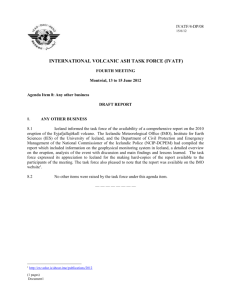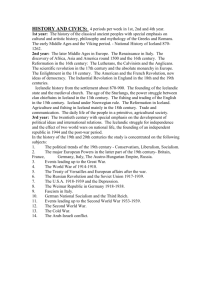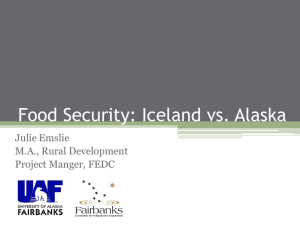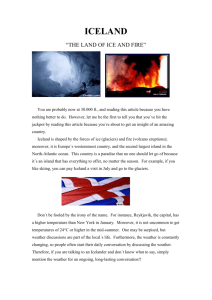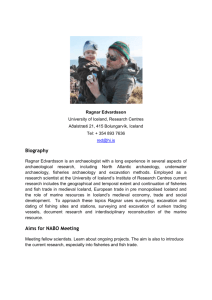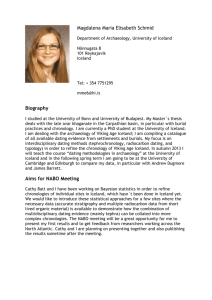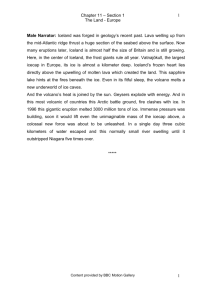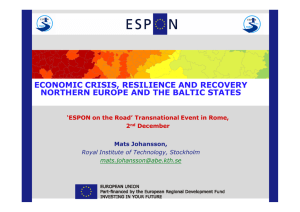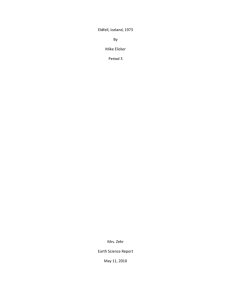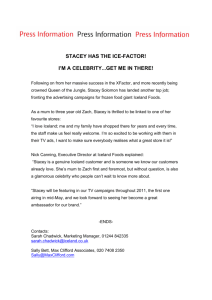iceland - Emily Williams
advertisement
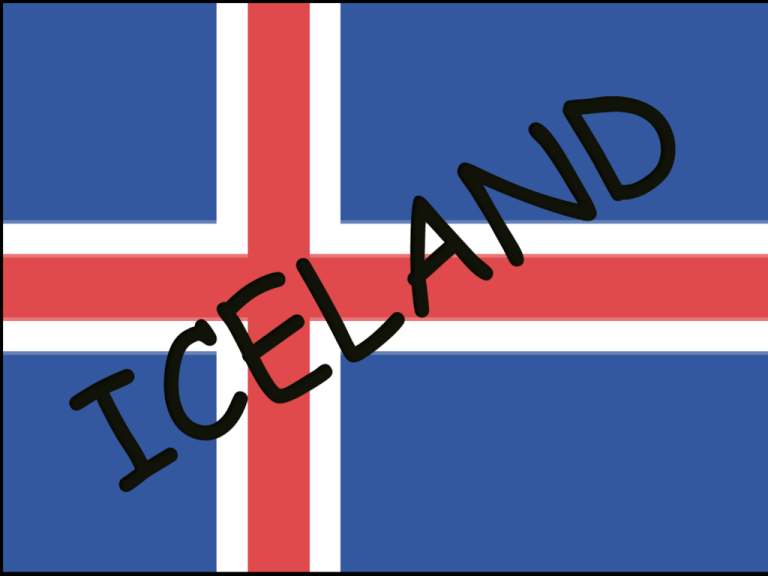
President: Ólafur Rangar Grímsson Prime Minister: Johanna Sigurdardottir Land area: 38,707 sq mi (100,251 sq km); total area: 39,768 sq mi (103,000 sq km)1 Population : (2010 est.): 308,910 (growth rate: 0.7%); birth rate: 13.3/1000; infant mortality rate: 3.2/1000; life expectancy: 80.8; density per sq km: 3 Capital and largest city[2003est]: Reykjavik, 184,200 (metro. area), 114,800 (city proper) Iceland is a small island quiet a bit above the UK. The earliest inhabitants of Iceland were Irish hermits, who left the island upon the arrival of the pagan Norse people in the late 9th century. A constitution drawn up c. 930 created a form of democracy and provided for an Althing, the world's oldest practicing legislative assembly. The island's early history was preserved in the Icelandic sagas of the 13th century. In 1262–1264, Iceland came under Norwegian rule and passed to ultimate Danish control through the unification of the kingdoms of Norway, Sweden, and Denmark (the Kalmar Union) in 1397. In 1874, Icelanders obtained their own constitution, and in 1918, Denmark recognized Iceland, via the Act of Union, as a separate state with unlimited sovereignty. It remained, however, nominally under the Danish monarchy. During the German occupation of Denmark in World War II, British, then American, troops occupied Iceland and used it for a strategic air base. While officially neutral, Iceland cooperated with the Allies throughout the conflict. On June 17, 1944, after a popular referendum, the Althing proclaimed Iceland an independent republic. Ash Plume Wreaks Havoc on Air Travel In late March 2010, the Eyjafjallajokull volcano erupted. The event produced minimal seismic activity, but an explosion on April 14 resulted in a volcanic ash plume in the atmosphere over northern and central Europe. Air travel in the region was halted for several days, causing the cancellation of several thousand flights and disrupting the travel plans of millions of people. Geography Iceland, an island about the size of Kentucky, lies in the north Atlantic Ocean east of Greenland and just touches the Arctic Circle. It is one of the most volcanic regions in the world. More than 13% is covered by snowfields and glaciers, and most of the people live in the 7% of the island that is made up of fertile coastland. The Gulf Stream keeps Iceland's climate milder than one would expect from an island near the Arctic Circle. Energy Situated on the Mid-Atlantic Ridge, Iceland is a hot spot of volcanic and geothermal activity: 30 post-glacial volcanoes have erupted in the past two centuries, and natural hot water supplies much of the population with cheap, pollutionfree heating. Rivers, too, are harnessed to provide inexpensive hydroelectric power. People Out of a population numbering more than 280.000, half live in the capital Reykjavík and its neighbouring towns in the southwest. Keflavík International Airport is located about 50 km from the capital. The highland interior is uninhabited (and uninhabitable), and most centres of population are situated on the coast. Language Iceland was settled by Nordic people in the 9th century - tradition says that the first permanent settler was Ingólfur Arnarson, a Norwegian Viking who made his home where Reykjavík now stands. The Icelanders still speak the language of the Vikings, although modern Icelandic has undergone changes of pronunciation and, of course, of vocabulary! Iceland is alone in upholding another Norse tradtion, i.e. the custom of using patronymics rather than surnames; and Icelander´s christian name is followed by his or her father´s name and the suffix son or -dóttir, e.g. Guðrún Pétursdóttir (Guðrún, daughter of Pétur). Members of a family can therefore have many different "surnames", which sometimes causes confusion to foreigners! Country Iceland is an island of 103.000 km2 (39,756 sq.miles), with an average height of 500 m above sea level. Its highest peak, Hvannadalshnjúkur, rises to 2.119 m and over 11 per cent of the country is covered by glaciers, including Vatnajökull, the largest in Europe. Iceland, the land of ice and fire, is a true paradise for volcanologists. In few places on earth, geology and human history are so closely connected to volcanism as on Iceland. The island owns its existence to a large volcanic hot spot sitting on a mid-oceanic ridge, a unique setting. The plate boundary between the American and Eurasian tectonic plates crosses Iceland from south to North and the spreading process can be directly measured and observed on land. Volcanoes are openings in the Earth’s surface. When they are active they can let ash, gas and hot magma escape in sometimes violent and spectacular eruptions. The word volcano originally comes from the name of the Roman god of fire, Vulcan. V O L C A N O S Religion Evangelical Lutheran Church; state church of Iceland: 87.1% Lutheran free churches: 4.1% Other: 8.8% Transport Air transport: Daily flights, most of them operated by Iceland air, link Iceland with more than 20 gateways in Europe and North America. Flight time is 2-4 hours to Western Europe and 5-8 hours to North America. Domestic services operate to Iceland's main regional communities, with flight time of less than one hour. Approximately 40% of total foreign currency earnings are from marine products. Some 99% of imports and exports are carried by marine transport, most of them handled by Iceland's two major shipping companies, Sam skip and Eimskip. Education Mandatory from 6 to 15 years of age. Schools for compulsory education: 193 Schools above compulsory education: 37 Universities and colleges: 8 Sports in Iceland are very popular. For nine recent years, Iceland remains a very healthy nation. Popular sports include handball, football , athletics , basketball , golf , volleyball , tennis , swimming , and chess ; horseback riding on Icelandic horses is also popular. The country's chess clubs have created many chess Grandmasters including Friðrik Ólafsson, Johann Hjartarson, Margeir Pétursson, and Jón Loftur Árnason, and Golf is especially common (around 1 in 8 Icelanders play), but the oldest sport association in Iceland is the Reykjavik Shooting Association, founded 1867. Rifle shooting became very popular in the 19th century and was heavily encouraged by politicians and others pushing for Icelandic independence. Shooting remains popular and all types of shooting with small arms practiced in the country. Annie Mist Thorisdottir Age: 23 Height: 5'7" Weight: 148 lbs Date of Birth: 09-18-89 Place Of Birth: Iceland Started Cross Fit: Recently Lives In Iceland Affiliate: Boot camp, Cross Fit Sport
